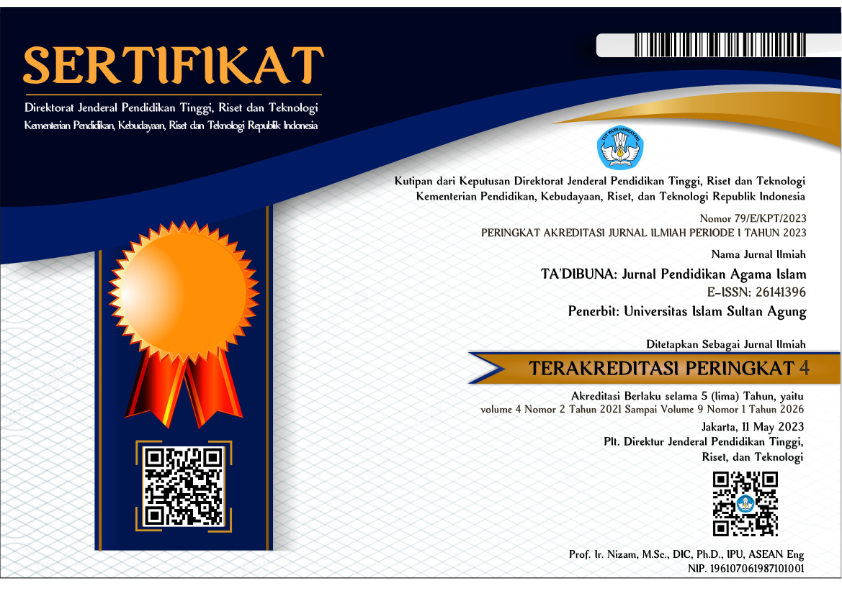Model Pembelajaran PAI Berbasis ISRA dalam Meningkatkan Moderasi Beragama Mahasiswa di Perguruan Tinggi
Abstract
Penelitian ini bertujuan untuk mengukur keefektifan model pembelajaran berbasis ISRA di Perguruan Tinggi Umum, survey menunjukkan bahwa indikator moderasi beragama berupa komitmen kebangsaan, Toleransi, Anti kekerasan, dan adaptif kebudayaan lokal dapat diterapkan pada kurikulum PAI di perguruan Tingggi Umum. Berbagai penelitian model pembelajaran berbasis moderasi beragama yang dilakukan menghasilkan 50 % hasil cukup signifikan, maka penulis mencoba model pembelajaran berbasis ISRA dalam moderasi beragama ternyata hasilnya cukup baik. Metode yang digunakan adalah deskriptif kuantitatif dengan pengumpulan data menggunakan angket, wawancara dan studi dokumentasi. Responden data yang diambil 90 mahasiswa sebagai sampel dari berbagai perguruan tinggi umum di Jawa Timur, menggunakan hasil uji analisis melalui Cronbach Alpha dan Wilcoxon dengan hasil yang signifikan 0,05% dari data yang diambil maka Penggunaan model ISRA cukup efektif dalam mengimplementasikan moderasi beragama sehingga dapat meningkatkan sikap moderat pada mahasiswa.
Keywords
Full Text:
PDFReferences
Akbulut, M. Åž., & Hill, J. R. (2020). Case-Based Pedagogy for Teacher Education: An Instructional Model. 12(2).
Akhmadi, A., & Belakang, A. L. (2008). Moderasi Beragama Dalam Keragaman Indonesia Religious Moderation In Indonesia ’ S Diversity. 45–55.
Asher, K. H. (2020). Moderation and the liberal state: David Hume ’ s history of. xxxx. https://doi.org/10.1016/j.jebo.2020.08.027
Demir, S. (2021). The Impact of Differentiated Instructional Media on the Motivation and Opinions of Students towards Science Learning in Terms of Learning Styles. 9(3), 16–25.
Elizabeth, B., Hubbell, R., & Goodwin, B. (n.d.). Instructional Models Doing the Right Things Right.
Fahri, M., & Zainuri, A. (2019). Moderasi Beragama di Indonesia. Intizar, 25(2), 95–100.
Jirasatjanukul, K., & Jeerungsuwan, N. (2018). The Design of an Instructional Model Based on Connectivism and Constructivism to Create Innovation in Real World Experience. 11(3), 12–17. https://doi.org/10.5539/ies.v11n3p12
Kaztaevna, T. G., Omarovna, A. R., Askerkhanovna, T. K., Zhanarbekovna, B. A., & Erezhepovna, K. N. (2015). Education of Tolerant Personality of a Future Specialist as the Social-Pedagogical Phenomenon. International Education Studies, 8(2), p169. https://doi.org/10.5539/ies.v8n2p169
Khan, K. A., & Rana, R. A. (2021). Effect of Higher Order Thinking Instructional Model on Scientific Reasoning of Grade VIII Students. 43(1), 77–92.
Liebman, C. S. (1983). Extremism as a Religious Norm. Journal for the Scientific Study of Religion. https://doi.org/10.2307/1385593
Lubiano, M. L. D., Instructional, M. S. E., Lubiano, M. L. D., & Magpantay, M. S. (2021). Enhanced 7E Instructional Model towards Enriching Science Inquiry Skills To cite this article: Enhanced 7E Instructional Model towards Enriching Science Inquiry Skills.
Muhtarom, A. (2017). THE STUDY OF INDONESIAN MOSLEM RESPONSES ON SALAFY- SHIA TRANSNATIONAL ISLAMIC EDUCATION INSTITUTION, SHIASHIA. Jurnal Ilmiah Islam Futura, 17(1), 73. https://doi.org/10.22373/jiif.v17i1.1645
Nasution, A. (2020). Moderasi Beragama di Era Disrupsi Digital. In Literasi Moderasi Beragama di Indonesia.
Pipattanasuk, T., & Songsriwittaya, A. (2020). Development of an Instructional Model with Augmented Reality Technology for Vocational Certificate Students. 13(3), 539–554.
Rahmat, M. (2022). The Impact of Inclusive Islamic Education Teaching Materials Model on Religious Tolerance of Indonesian Students. 15(1), 347–364.
Rahmat, M. & Fahrudin. (2018). Understanding the Meaning of Khalifah fil ardhi in the Quran and Implications on Education. IOP Conference Series: Earth and Environmental Science, 145, 012121. https://doi.org/10.1088/1755-1315/145/1/012121
Rahmat, M.-, & Yahya, M. W. (2020). Trials of the Islamic Education Learning Model in Indonesian Universities: A Sufistic Approach as An Alternative. International Journal of Higher Education, 10(2), 253. https://doi.org/10.5430/ijhe.v10n2p253
Saenab, S., Zubaidah, S., Mahanal, S., & Lestari, S. R. (2021). education sciences ReCODE to Re-Code: An Instructional Model to Accelerate Students ’ Critical Thinking Skills.
Seechaliao, T., & Yurayat, P. (2021). Effects of the Instructional Model Based on Creative Problem-Solving Principles with Social Media to Promote the Creation of Educational Innovation for Pre-service Teachers. 11(3), 56–69. https://doi.org/10.5539/hes.v11n3p56
Sutrisno, E. (2019). Aktualisasi Moderasi Beragama di Lembaga Pendidikan Actualization of Religion Moderation in Education Institutions. 12(1).
Vereş, S. (2021). THE FLIPPED CLASSROOM AS AN INSTRUCTIONAL MODEL. X(1), 56–67. https://doi.org/10.24193/RRGE120214
Widodo, J., Huda, C., Dirgatama, A., & Wirawan, A. W. (2020). Feasibility test application of information systems in the media as a learning in vocational school. 14(1), 28–33. https://doi.org/10.11591/edulearn.v14i1.14674
Wodaj, H., Belay, S., Effects, S., Wodaj, H., & Belay, S. (2021). Effects of 7E Instructional Model with Metacognitive Scaffolding on Students ’ Conceptual Understanding in Biology To cite this article: Effects of 7E Instructional Model with Metacognitive Scaffolding on Students ’ Conceptual Understanding in Biology.
DOI: https://dx.doi.org/10.30659/jpai.5.2.110-128
Refbacks
- There are currently no refbacks.
Ta’dibuna: Jurnal Pendidikan Agama Islam is published by the Master Program of Islamic Education, Faculty of Islamic Studies, Universitas Islam Sultan Agung (UNISSULA), Indonesia.
Jl. Raya Kaligawe Km. 4, PO BOX 1054/SM, Semarang, Indonesia 50112
Email: jurnaltadibuna@unissula.ac.id








